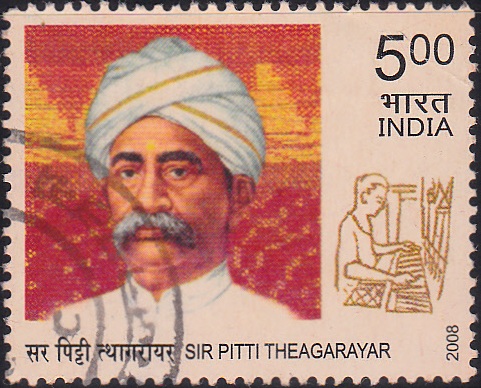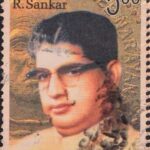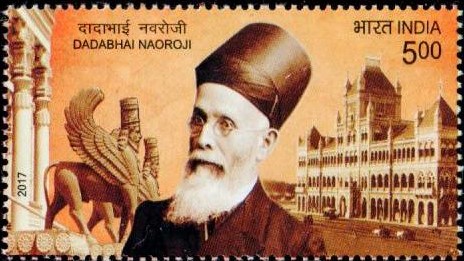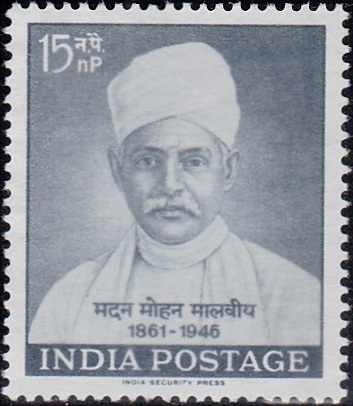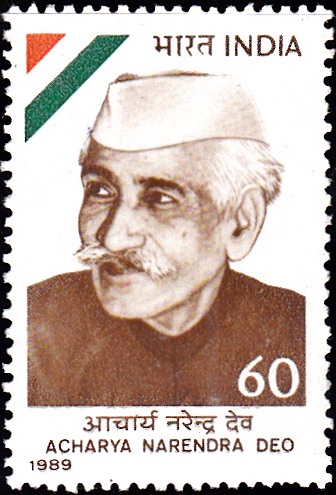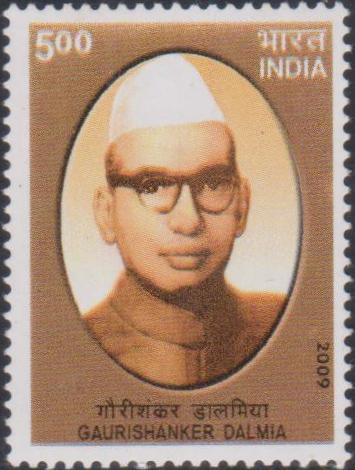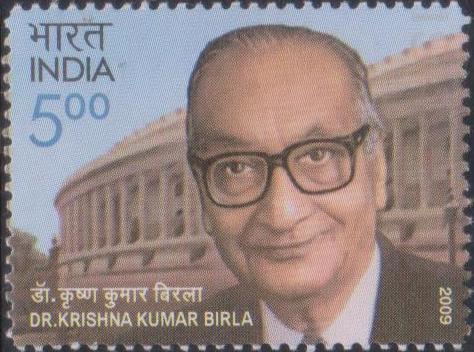
Dr. Krishna Kumar Birla
A commemorative postage stamp on Dr. Krishna Kumar Birla, an Indian industrialist from Birla family :

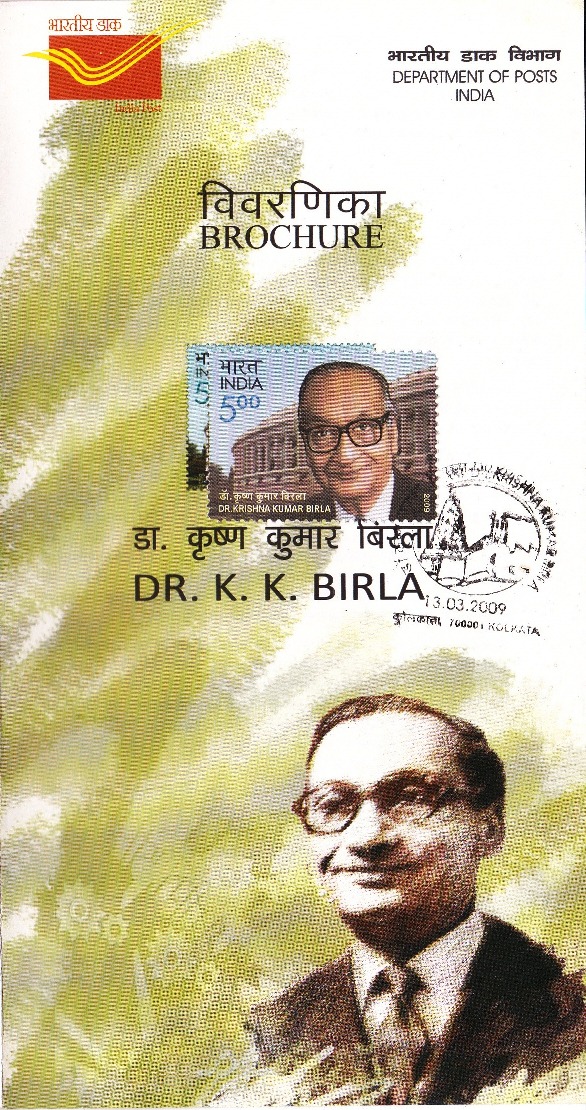 Issued by India
Issued by India
Issued on Mar 13, 2009
Issued for : India Post is proud to issue stamp on Dr. K.K. Birla.
Credits :
Stamp : Bharti Mirchandani
Cancellation : Alka Sharma
Type : Stamp, Information Brochure with stamp & first day cancellation
Colour : Multi Colour
Denomination : 500 Paise
Stamps Printed : 0.8 Million
Printing Process : Wet–offset
Printer : India Security Press, Nasik
Name : Krishna Kumar Birla
Born on Oct 12, 1918 at Pilani, Rajasthan, India
Died on Aug 30, 2008 at Kolkata, India
About :
- The life of Krishna Kumar Birla can be seen as a chapter in the history of independent India. Patriot, industrialist and philanthropist. Birla not only played his part in the run-up to the independence of the nation but was protagonist in the nation-building exercise that followed 1947. A true visionary, he saw that a strong and prosperous India was wedded to the Nehruvian nation of industrially robustness. Both as an industrialist as well as a philanthropist. Birla saw entrepreneur as a firm route to serving the nation.
- Born in Pilani, in the Jhunjhunu district of Rajasthan on November 11, 1918. Birla graduated from Punjab University, Lahore, in 1940. Being the son of the Late Ghanshyam Das Birla, a friend and a close associate of Mahatma Gandhi, he saw the freedom movement at the closest of quarters. Since 1934 till the day he was assassinated on January 30, 1948 Gandhiji stayed at the Birla House in New Delhi. Birla then in his late 20s, looked after all the arrangements at Birla House in respect of the Mahatmaji and his associates whenever they would come to Delhi in the process, he became quite close to Gandhiji.
- It was after independence when Jawahar Lal Nehru became the first Prime Minister of India, that, that Birla played his part in nation-building. He met Panditji frequently and became close to Indira Gandhi, the future Prime Minister of India.
- Apart from being an industrialist, Birla was also involved in politics. He joined the Congress Party in 1984 as a life member, being elected to the Rajya Sabha the same year nominated by the Congress under the leadership of Indira Gandhi. Birla contested Rajya Sabha elections and was a very active Member of Parliament for three times between 1984 and 2002. On his retirement, Congress president Sonia Gandhi wrote to him a letter highly appreciating his Services to the party and the country. He is survived by three daughters Nandini Nopany, Jyotsana Poddar & Shobhana Bhartia, became a Member of Parliament, Rajya Sabha, nominated by the President of India.
- Birla was also a member of the Nation integration Council of which the Prime Minister is the Chairman and all state Chief Minister are members. As an industrialist, Birla had interests that included a broad swathe of sectors textiles, sugar, engineering, shipping, fertilizers and information technology. He was the Chairman of the Chambal Fertilizers & Chemicals Ltd., Zauri Industries Ltd., Texmaco Ltd., Sutlej Textiles & Industries Ltd., HT Media Ltd. the publisher of Hindustan Times, besides other publications that include Hindustan and Mint.
- In his busy life, Birla made time to write three books, Indira Gandhi Reminiscences, a selection of his speeches and writings; Partner in Progress; and his autobiography, Brushes with History. All three provide incisive insights not only to his rich life but also to that of an India spanning decades.
- Birla was also a keen educationist. He was the Chairman and Chancellor of the Birla industries of Technology and Science (BTS) a campus each at Pilani, Goa, Hyderabad and Dubai, with a total strength of about 9,000 students since 1983. In addition to these students, an additional 15,000 receive high order education through off-campus and collaborative programmes making the total number of students around 24,000. The Hyderabad Campus started functioning only from August 2008 during the last week of Birla’s life.
- Birla’s vision was to inculcate the culture of high quality engineering education at a price that was not out of the reach of students. Thus, the fees at BITS were very reasonable and almost a third of students would be on some scholarships. BITS has acquired a very high reputation and 25% of its graduates are absorbed in foreign institutions across the world including in US and Britain.
- But it was a visionary industrialist that Birla will be primarily remembered. He served for a number of years on the central board of the State Bank of India and also on the board of ICICI. He was a member of a number of committees appointed by the Government of India and was rightfully regarded as one of the top leaders of the business community of India.
- Owing to the advancing age, Birla had taken semi-retirement from politics and business. But that did not stop him from being in touch with the top political leaders of the country. Whenever he was in Delhi, he regularly visited the Central Hall of Parliament where many members of the Parliament, ex-Members of Parliament and veteran Ministers met him over a cup of tea.
- Birla and his late wife Manorama Devi had constructed the magnificent Shri Radha-Krishna Temple in Kolkata that covers an area of nearly 22,000 sq. ft. with its shimmering sandstone exterior, the temple is an exquisite work of art in the heart of Kolkata, decorated with intricate carving of elephants, flowers and bells. The temple was inaugurated in February, 1996 and is thronged by both devotees and non-religious visitors.
- As part of his belief in acknowledging and encouraging talent and enterprise, Birla had established the K.K. Birla foundation that confers awards in Indian literature, scientific research, Indian philosophy, art and culture and sports every year. He believed that a holistic development in all spheres in what makes a nation proud and strong. The K.K. Birla Academy was specifically set up by him for the purpose of pursuing research on scientific, historical and cultural subjects.
- What Birla believed for the nation, he practised himself. Apart from his busy schedules as an industrialist, philanthropist and a politician, he had a range of hobbies that included reading, listening to music and playing bridge when on holidays. Incidentally, he was the president of the Bridge Federation of India for a number of years and also that of the Lawn Tennis Association (1980-85), besides other prestigious clubs. Birla was conferred Doctor of letters (Honoris Causa) by Pondicherry University in 1997.
- Birla’s secular credentials were always firmed up by his being rooted to the cultural-religious aspects of India. He had a deep understanding of the Bhagawat Gita, was in full adherence to Hindu traditions and culture and kept a disciplined life that had helped him in no small measure to lead an active life even at his advanced age.
- In essence, Krishna Kumar Birla was an Indian whose life reflects the story of independent, modern India.
- Text : Based on material supplied by the proponent.
Subscribe
Login
0 Comments


